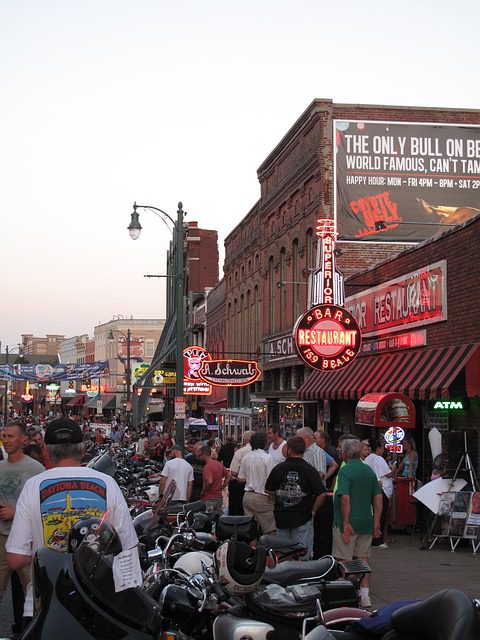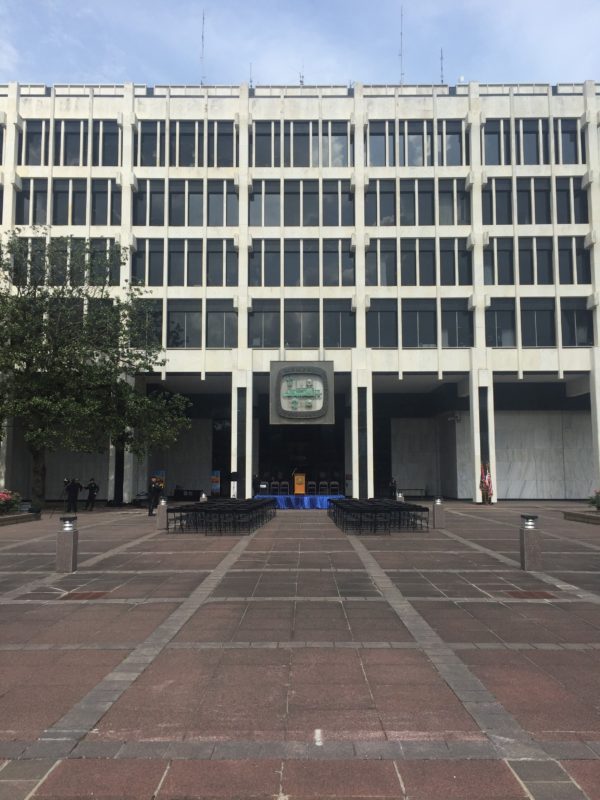The American Resilience Roadtrip series follows concerned citizen Ben Colombo on a year-long, 50-state tour to find out how city governments, citizen groups, nonprofits, and others are making their communities more sustainable, more resilient, and better served. Follow Ben and ICLEI USA on Twitter and Instagram as we discover a more sustainable, more compassionate USA thriving at the ground level.
Beale Street in City of Memphis is a hub of Blues, Rock, food and culture.
“I’m going to Graceland…” Heading in to Memphis, I couldn’t help but succumb to the urge to listen to Paul Simon’s classic roadtrip song, nor could I avoid the siren call of Elvis’s suburban mansion that he sung about over 30 years ago. Elvis’s house was beautiful, at least it looked it from the front gate, but as a landmark it was designed to be visited by car, just like in Paul Simon’s song.
After speaking with Jenna Thompson, the head of Memphis-Shelby County’s Office of Sustainability, it struck me that, before the next 30 years are out, the notion of a roadtrip song about Memphis might seem a bit stranger. As so many cities are, Memphis is in a period transition.
Planning a Regional ‘Greenprint’
Right: Jennifer Thompson, Sustainability Director for the Shelby County Office of Sustainability
The City, which has fallen victim to environmental disaster in its past, is making strides to become more sustainable, resilient and crucially, livable. The Office of Sustainability plays a unique role, acting as the “green” liaison for both City and County mayors.
In 2011, the Office of Sustainability received the HUD Sustainable Communities Regional Planning Grant in the amount of $2.6 million to plan a regional Greenprint. The Mid-South Regional Greenprint includes parks, greenways, bike trails and walking paths, byways, blueways, conservation lands, natural areas, wildlife management areas, open space areas, community gardens, stormwater management areas, and other similar spaces.
The plan covers 18 municipalities in four counties and three states. A 332-person consortium group of greenway organizations, related businesses, colleges and universities, citizens groups, and local and state governments lead the planning effort, while 80 organizations have served in the Mid-South Regional Greenprint & Sustainability Consortium. Twenty “subplanning” projects were selected in a competitive process to be recipients of funding, ranging from plans for a multi-modal town center in Frayser to an eco-park plan for the Arkansas side of the Harahan Bridge.
Memphis Makes Strides as Cycling Hotspot
One of the most visible signs of this effort for residents and visitors alike is the proliferation of bike paths and lanes that have been laid down across the city, as part of the Mid-South Regional Greenprint. Jenna told me how Memphis is hoping to become the Mississippi River crossing point for bikers who are riding across the country and it is clearly taking this ambition seriously.
At the same time, the Greenprint is also providing a foundation to make Memphis residents happier and healthier, hopefully proving that environment and economy can go hand in hand.
Other changes afoot are slightly less noticeable, if no less important: Jenna’s office is trying to nudge, cajole, inspire, encourage and educate its peers in government and its constituents in the community to take action towards realizing the goals of the Sustainable Shelby Implementation Plan, a comprehensive long-term document intended to guide the City’s and County’s interagency efforts.
The plan is not about environment alone and recognizes the inter-sectoral connectedness that sustainability embodies — chapters are devoted to community livability, connectedness and diversity, economic sustainability, and government actions to lead by example. For instance, the transformation of Shelby Farms Park, connected with Wolf River greenways and the CSX rails-to-trail project, provides more linkages between unique natural resources that more holistically connects neighborhoods, people, and entire communities to a shared commitment for a greener city.
Economic strategies include establishing a Sustainability Seed Fund. This fund would provide early stage capital for local green businesses, innovators, and participants in a Green Business Incubator aimed at creating green jobs and growing a green sector in the regional economy. View the full plan and progress checklist here.
All of this is no easy task and requires concerted change management, but with a little luck they’ll be successful, and next time I visit Memphis, I’ll be riding my bike to Graceland.
Memphis-Shelby County Office of Sustainability
Ben Colombo is a Senior Vice President at a New York based CEO advisory firm. He is inspired by the critical role that local governments and organizations are playing to address sustainability and resilience issues across the United States and is proud to partner with ICLEI USA on The American Resilience Roadtrip. Follow the Roadtrip on Twitter and Instagram.


